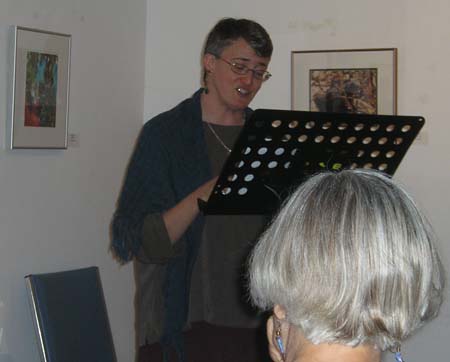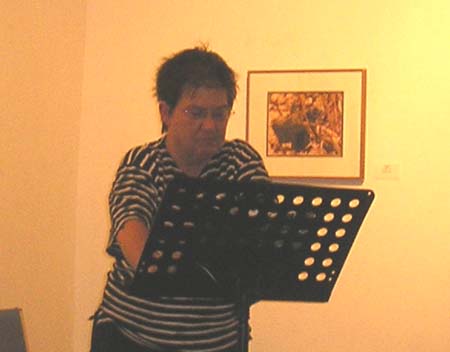
Susan Palwick began the evening reading excerpts from her newest collection of short stories entitled The Fate of Mice. The story was set in the period before “The Change” in 2029 when all matters of progressive social causes are embraced due to a sudden breakthrough in human consciousness that has everyone realizing that conflict and antagonism just wasn’t working out. It is a time of mutually-assured happiness augmented by the pharmaceutical industry’s help (after “The Change” even the pharmaceutical companies admit to their previous deceptive and heinous activities and offer to provide for everyone free of charge).
The main protagonist is the father who blends in nicely with a vast array of conspiracy theorists who nurture his fantasies about the inhumanity in the world before the change. He keeps in contact with them on the Internet. However, as all of his theories about vast and secretive harms done in the world melt away, he becomes a victim of “conflict addiction.” He can’t help himself from thinking someone is out to get him all the time even though the rest of society has moved on from that point.
The rational glue that holds the family together is Nate, the son who at the outset is trying to assuage his father’s guilt for bringing him into the world by attempting to convince him that there is some good stuff in the world too. After “the Change” Nate and his sister are put in charge of attending to their father’s slippery hold on the reality that conflict really is a thing of the past. With the help of a new industry of amusement parks that endeavor to comfort those who are addicted to conflict by trumping up and recreating a bygone era when men were known to compete vociferously, the father begins to get the help he needs. The past has never been so nostalgically poisoned.

Ellen Klages read from several sources, and in doing so, proved why her writing defies all labels. She read a short piece from Portable Childhoods available from her website here which included called “Möbius, Stripped of a Muse” that reflected the struggles of a female writer trying to put together the plot for a far-out science fiction book and failing to get the approval of her academic mentor. the story moved in and out of the frame of the writer’s story, then back into the head of the writer.
She then read from “Knuckles,” a story about the reluctant, misbegotten love a mother has for her child. And “Columbus Day” a hilarious representation of a mother who is learning what Columbus Day means to her child and trying not to be a little bit appalled.
Finally, there was a story about whether one’s nine-year-old self would be able to get along with a subsequent nine-year-old offspring.
Klages wrote all of these “childhood” pieces without mirrors and without the virtue of ever having children. She assured her audience that she sometimes is mistaken for having the same keen insights as a mother.





















No comments:
Post a Comment